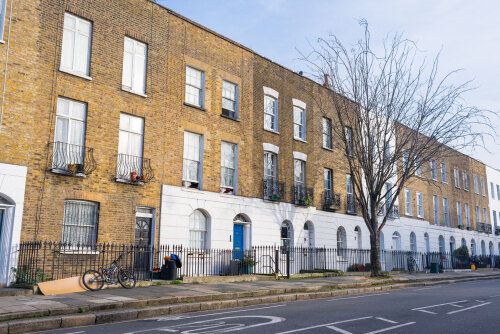Leasehold vs freehold: key differences explained
When you buy a property, it’s reasonable to assume it’s yours to do with as you please — planning permission and building regulations aside. However, in some circumstances, though you may effectively own a property, you might not own the land the property sits on.
This is called a leasehold, and is a common form of ownership when multiple properties sit within one building or on one piece of land, such as with a block of flats. In this case, each resident might own their apartment unit (their living space and its fixtures), but a landowner — or freeholder — owns the building itself. Leaseholders, though ‘owners’ in the conventional sense, are actually ‘tenants’ of the land, and must pay charges to the landowner.
Though it’s less common, individual houses are also sometimes sold as leaseholds, particularly in large metropolitan areas. And there has been some controversy in recent years about new-build houses being sold on a leasehold basis, even in rural and suburban areas.
This article will go into the differences between the two statuses, explain how leaseholds work, and flag up some potential problems you might face if you buy a property in this way.
Leasehold vs. freehold: what’s the difference?
Although both leaseholds and freeholds mean you (effectively) own a property, there are some crucial differences between the two situations. If you’re considering investing in a property, it’s important to find out whether you’re being offered a freehold or a leasehold.
What is a freehold?
If you own the freehold of a property, you own the property and the land it sits on outright. The land is in your name in the land registry, and you own the ‘title absolute’. This is the traditional and most conventional way of buying a home.
What is a leasehold?
A leaseholder, on the other hand, owns only the property itself, and not the land. The leaseholder has a contract with the freeholder which sets out the legal rights and responsibilities of each party. Leaseholders may have to pay the freeholder an annual ‘ground rent’ to effectively rent the land their property sits on (more on this later).
How do leaseholds work?
Leaseholders are only entitled to occupy their property for a set period, which is mentioned in the lease document. Leases are usually for at least several decades. Once this period elapses, however, ownership of the property reverts to the landowner unless the leaseholder is able to extend the lease (which can be a costly and onerous process).
The leaseholder’s responsibilities
Leaseholders have certain responsibilities, which are laid out in detail in their lease document. A leaseholder is usually responsible for:
- Paying ground rent
- Paying service fees
- Paying for contents insurance (though this is not a legal requirement)
- Fulfilling the terms of their lease
The freeholder’s responsibilities
In a leasehold, the freeholder also has responsibilities they have to fulfil. In general, they’re responsible for:
- Upkeep of the common areas and the exterior of the property
- Paying for buildings insurance
- Managing the maintenance of the building or land
How long is a lease?
Leases are generally long-term. Newly created leases might be 99 or 125 years. In some cases, you may even find leases of 999 years — which is effectively as good as a freehold.
If you’re buying a leasehold, it’s important to check how long it is as the number of years left on a lease can drastically reduce the value of a property. You should be wary of leases of less than 80 years, as this can make a property hard to sell and some lenders may even refuse to give you a mortgage.
If you have a short lease, it is possible to extend it, though this can be very expensive, especially if the lease is 60 years or less. Generally, the cost of a lease extension is 50% of the ‘marriage value’ of the property — that is, the extra value that a longer lease would add.
Depending on the value of the property, you may also have to pay Stamp Duty. You usually can’t extend a lease until you have owned it for at least two years.
Ground rent
Ground rent is a fee paid to the freeholder by the leaseholder, effectively to rent the land their property sits on. Traditionally, ground rent was a nominal sum (known as a peppercorn rent), but many leaseholders now complain that ground rents have risen to several hundred pounds annually, or even more.
Before buying a leasehold, you should be sure to check the documents carefully to see how much ground rent is payable and how often the freeholder can change this amount. In some cases, ground rent can be doubled every few years, which can result in leaseholders paying extortionate rates.
In other cases, ground rent is tied to an index such as the Retail Prices Index (RPI), which means it will only rise with inflation. It’s also worth noting that ground rent is automatically reduced to zero if you extend your lease.
Other fees
Leaseholders are usually also required to pay service charges to cover maintenance and repairs to the building’s exterior and common areas such as stairwells and lifts in the case of apartment buildings. Leaseholders may also be charged for costs such as buildings insurance, which is handled by the freeholder (but paid for collectively by all of the leaseholders in the building).
Part of your service charge as a leaseholder might also go into a ‘sinking fund’, which is effectively a pot of money set aside for any major repairs or works. As a leaseholder, you may not have control over how much money you put into this pot, or indeed how it is eventually spent.
Restrictions on how the property is used
One of the biggest disadvantages of leaseholds is that the freeholder can dictate how you use your property, even though you own it. For example, there may be rules included in your lease that say you can’t run a business from your property, sublet it, or have pets.
There are often also rules as to the changes you can make to your property, and you usually have to ask permission from the freeholder to carry out any major works.
Common issues with leaseholds
Generally speaking, a freehold is a sounder investment choice than a leasehold, because it means you own the property and the land it sits on outright (although of course, your mortgage provider could still repossess it later if you fail to make payments).
Here are some common issues reported by leaseholders:
Increased ground rent or fees
Depending on the terms of your lease, the freeholder could increase the ground rent leaseholders have to pay. When ground rent is particularly high, leaseholders can sometimes find it difficult to sell their property. The average cost of ground rent in the UK is now about £400 per year.
Service charges can also often be high, and as a leaseholder, you likely won’t have much control over how much you pay. These charges can be particularly high in newer buildings with more costly facilities such as indoor gyms or pools.
Inadequate building maintenance
Some leaseholders complain that the freeholder (or the company they employ to manage the property) doesn’t fulfil their obligations concerning the maintenance and upkeep of the building. Repairs might take a long time to be completed or might not be completed to an acceptable standard. Unfortunately, you may have little control over this as a leaseholder, though you may be able to resolve the problem by consulting with the freeholder directly, your tenants’ association, or even a civil mediator.
Unfair terms
Another common complaint made by leaseholders is that they are not allowed to use their property as they would like to. This might include lease terms that ban pets or say that they cannot use the property as a place of business. If you’re considering buying a leasehold, it’s important to study the rules you would be expected to follow and consider whether it would significantly affect your life.
What should buyers be aware of?
If you’re considering buying a leasehold property, you should always make sure you know how long the lease is. A short lease can be very difficult to sell on later, and the cost of extending a lease can be high. In particular, you should look for leases that are ideally 100 years or more, but more than 80 years at the very least.
Here are some other things to be aware of, which can all be found in the lease document:
- Ground rent and how often it can be changed
- Fees and how these are decided
- Restrictions on use of the property
Although we’ve presented some of the potential pitfalls of leaseholds in this article, there are some advantages for landlords too. For example, property owners in leaseholds can avoid the hassle of dealing with the maintenance of the exterior and common areas of the building and handling buildings insurance.
However, given the many potential problems you could run into, it’s best to think carefully before entering into a leasehold — and you should always consult a solicitor to translate the legalese for you.
Article by Annie Caley-Renn
At Home Made, we offer a hybrid lettings solution that adds value at every stage of the rental process. With our game-changing new landlord platform, The Property Wallet, we offer London landlords exceptional tenant-find and property management services for a low monthly fee.
- Avoid expensive upfront fees and spread the cost of marketing your property with the option to pay monthly.
- Free rent collection and arrears chasing.
- Sign off and see all charges and payments in your dashboard.
- Real-time updates on marketing, viewings, and offers.
Prices start from just £50+VAT/mo for tenant-find and £60+VAT/mo for management. Alternatively, you can pay a one-off upfront fee of £1,200+VAT for our tenant-find service.
If you would like to speak with us about your property needs, contact us via our website to find out how we can help. If you're ready to get started, book your free valuation here.
Book valuationCheck out more of our landlord advice here and follow us on Twitter, Linkedin, and Instagram for regular updates on industry compliance standards, market insights, and Home Made company news.




